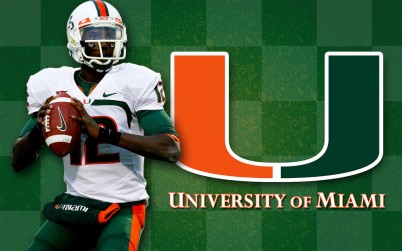By TORI ADDISON
Staff Writer
The NCAA ended its two year investigation of the University of Miami football program last week in what was arguably one of the most drawn out collegiate scandal cases of the decade. The case involved football booster Nevin Shapiro who illegally provided players with various benefits over an eight year time span. Luckily, the Hurricanes escaped with no more than a slap on the wrist.

When the news first broke in 2011, Shapiro was imprisoned for his involvement in not only a $930 million Ponzi scheme, but also for providing benefits to at least seventy-two athletes on the football team from 2002 to 2010. The long list of benefits ranged from cash rewards to prostitutes, and even included full paid dinners and night club bouts. Unfortunately, Miami football and basketball coaches were not totally ignorant to the crimes that were being committed. In fact, several of them were aware or active participants. Shapiro’s hefty donations to both athletic programs were funded thanks to the ill-played Ponzi scheme he was involved with. Although the NCAA had more than enough evidence against Shapiro to arraign him, the case was not so simple to close. The investigation was halted early this year as the NCAA had to take a second to investigate its’ own involvement within the scandal. Reports surfaced of NCAA employees who knowingly tainted parts of the case, causing 20% of the collected information against the University to be dropped. At this point, most fans who originally thought Miami would end up facing the death penalty were becoming more optimistic as they hoped the mishandling of case details would play a positive role for the sake of the football program. The final verdict was announced last Tuesday, stating that the Hurricanes would only lose twelve scholarships over a three year probation; nine for the football program and three for the basketball program. After facing a self-imposed bowl ban for the past two seasons, the University caught a huge break from what could have been a detrimental decision. The football team can once again compete for a bowl this season and with their undefeated start they may be able to pull one off.
The most surprising aspect of the case was not how it was handled, but rather how players and coaches’ dedication never left the team. Head coach Al Golden accepted the position in 2011, forcing him to be a deciding factor of instating the bowl bans for that current season and the next. As you can imagine, no first year head coach would enjoy being thrown into such a situation, but Golden carried on regardless. Most importantly, recruits still poured in despite the ongoing investigation. The Hurricane’s 2012 recruiting class was ranked within the top ten of the nation amidst the full-fledged scandal that was occurring at the time. Players were fully aware that the program could face the death penalty once the NCAA concluded case, but they committed to Miami anyway. Golden racked in 33 commits, 13 of whom were ranked among ESPN’s top 300 players of that year’s recruiting class. Although a handful of suspensions were handed out following the allegations against Miami, the team had no players request a transfer from the program. The commitment that the Hurricanes’ players and coaching staff put forth during the investigation was astounding.
Despite many people’s claim that the NCAA’s decision was not strict enough, Miami can finally breathe free without the case constantly looming in the back of their minds. The university is currently working to prevent such a scandal from happening again as they rightfully should. The time has finally come for the Hurricanes to put the past behind them and do what they do best, play some football.

